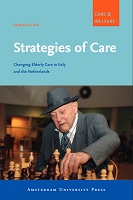Strategies of Care
Changing Elderly Care in Italy and the Netherlands
Abstract
This analytic study surveys the transformations of elderly care policies and practices since the early 1990s, by comparing the trajectories of two extremely different care systems: Italy, a familialistic model with no relevant changes in social policies; and the Netherlands, a formal care model under restructuring. The author demonstrates that, in spite of strong policy pressures, the Dutch system remains a formal care model and represents a case of institutional and social resistance to welfare restructuring By contrast, the Italian system has shifted from family-based to a mix of family- and market-based model, despite the absence of substantial policy intervention. She argues that the ongoing changes need to be seen from a micro-to-macro perspective, considering the choices and strategies of the actors that are limited and conditioned by the institutional framework, but also represent possible forces of social change. Strategies of Care analyseert de veranderingen in de ouderenzorg vanaf het begin van de jaren negentig van de vorige eeuw. Auteur Barbara Da Roit doet dit aan de hand van een vergelijking tussen Italië - een land met een traditioneel, weinig veranderlijk en familievriendelijk model - en Nederland, dat een formeel zorgmodel heeft dat grondig wordt herzien. Het onderzoek bespreekt de trends in de zorgbehoeften van ouderen tegen het licht van de veranderingen in de zorgpakketten. Aan de hand van een analyse op basis van gesprekken met familieleden, professionele zorgverleners en sleutelfiguren in de ouderenzorg geeft dit boek inzicht in de manier waarop zorgpakketten worden geconstrueerd en de logica die daarachter schuilgaat.
Keywords
public administration; sociology; bestuurskunde; sociologieDOI
10.5117/9789089642240ISBN
9789089642240OCN
700706928Publisher
Amsterdam University PressPublisher website
https://www.aup.nl/Publication date and place
2010Series
Care & Welfare,Classification
Sociology and anthropology
Politics and government


 Download
Download